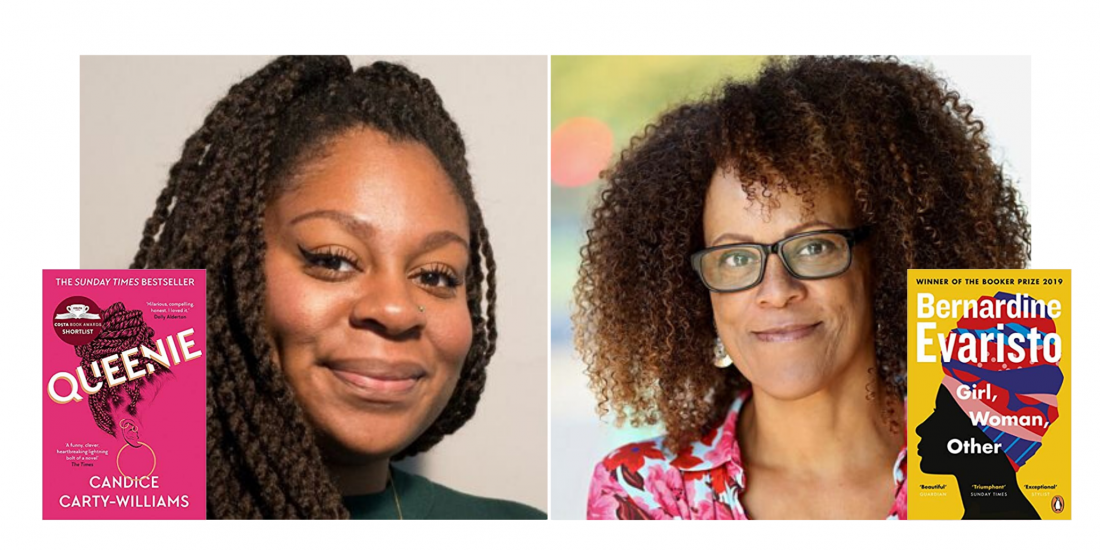When authors Candice Carty-Williams and Bernardine Evaristo became the first Black women to secure top awards for their writing this year, the accolade was somewhat bittersweet.

Bernardine’s eighth novel Girl, Woman, Other, which cleverly follows the lives of 12 connected characters, saw her become Author of the Year and secure Fiction Book of the Year at the 2020 British Book Awards.
The Fiction Book of the Year winning title has had QUITE the year with awards… Congratulations @bernardineevari, as Girl, Woman, Other takes the 2020 title! #Nibbies @katemosse @thetls @HamishH1931 pic.twitter.com/sLdvrkpyL9
— The Bookseller (@thebookseller) June 29, 2020
Meanwhile, Candice’s debut Queenie, about a 25-year-old Jamaican British woman navigating life in London, was crowned both Book of the Year and Best Fiction Debut at the “Nibbies”. Let’s not forget there will also be a TV adaptation for Channel 4.
Of course, Candice was overjoyed. A celebratory tweet, written predominantly in capital letters and liked 19,500 times, told us so. However, a later Guardian article explained why she was proud but not completely happy.
BOOK OF THE YEAR 2020 👑 And the FIRST Black AUTHOR to win it let alone Black WOMAN since the prize BEGAN in 1994? Sorry for all the caps but what are you telling meee #Nibbies pic.twitter.com/QqUGvfvgxP
— Candice Carty-Williams (@CandiceC_W) June 29, 2020
She said: “I know how these prizes are meant to work. Having been in the industry for a while, and with the help of Wikipedia, I knew that no black woman, or indeed black person, has won that prize (Book of the Year) since the awards were started in 1994. Ever. So apparently, in the last 26 years, there has been no book by a black author seen to be deserving of that prize. I’m not downplaying my novel, I’m mainly proud of it, but still, I can’t feel completely happy about how things have gone.
“In my second acceptance speech I ended up saying how sad it was that it had taken so long not just for a book like Queenie to be published, but to be given such attention in the industry and in the literary world. The last written words in the novel are #BlackLivesMatter, and it felt important for me to remind the overwhelmingly white publishing industry of this, especially at this time of great change and heightened awareness.”
No Black writer had been named the Author of the Year before so when Bernardine’s double award win was announced she said she “lost her cool”.
In another tweet, she wrote: “Bittersweet history-making. Still, the commercial and critical argument has been won. Let’s work towards a future where we no longer have these conversations because EVERYONE is included in the narrative: Asian, Black, disabled, LGBTQ+, white, working class.”
The 2019 joint Booker Prize winner is no stranger to firsts. Bernardine jointly won the Booker Prize with Margaret Atwood last year and was the first Black woman to do so since 1969. In June of this year, she made history again by being the first Black British woman to top the UK fiction paperback charts with Girl, Woman, Other. This was alongside Reni Eddo-Lodge whose debut, Why I’m No Longer Talking To White People About Race, rose to number one in the non-fiction paperback chart.
Happy to just win two awards at the British Book Awards #Nibbies: Fiction Book of the Year & Author of the Year. And there are TEN books by POC in the Top 10 charts – a 1/4 of all books! We can no longer be ignored. Here are my rec. new titles from my UKsisterwriters from March. pic.twitter.com/UtG8plBc7i
— Bernardine Evaristo (@BernardineEvari) June 29, 2020
In a powerful foreword for Rethinking ‘Diversity’ in Publishing – a 2020 report exploring how “cultural production might disadvantage writers of colour…and racial and ethnic minorities” –
Bernardine said it “arrives as another clarion call to an industry which, with all the apparent goodwill in the world, hasn’t changed fast enough to become more inclusive”.
Authored by Dr Anamik Saha and Dr Sandra van Lente of Goldsmiths, University of London, the report claimed to be the first academic study of its kind in the UK with The Bookseller (founder of the British Book Awards) being one of their partners.
The report highlighted major issues in the publishing industry such as Black, Asian and ethnic-minority audiences as well as working class audiences, being undervalued, and literary agents showing a lack of creativity when looking for new authors.
Bernardine continued: “…Unfortunately, for too many in the industry, books by writers of colour are still considered niche rather than having universal appeal, even when there are so many exceptions to prove otherwise.
“I was told that my 2013 novel, Mr Loverman, was negatively considered by some in the industry as triple niche because it was about an older, gay, black man. What were they saying? That whiteness reigns supreme, heteronormativity is acceptable and old people begone from the pages of our books because you are of little importance? The truth is that good literature about anything can be enjoyed by all kinds of people. Literature transcends all perceived differences and barriers. It’s partly the point of it.”
Written by Vicky Gayle – Follow her: @vi_gayle












